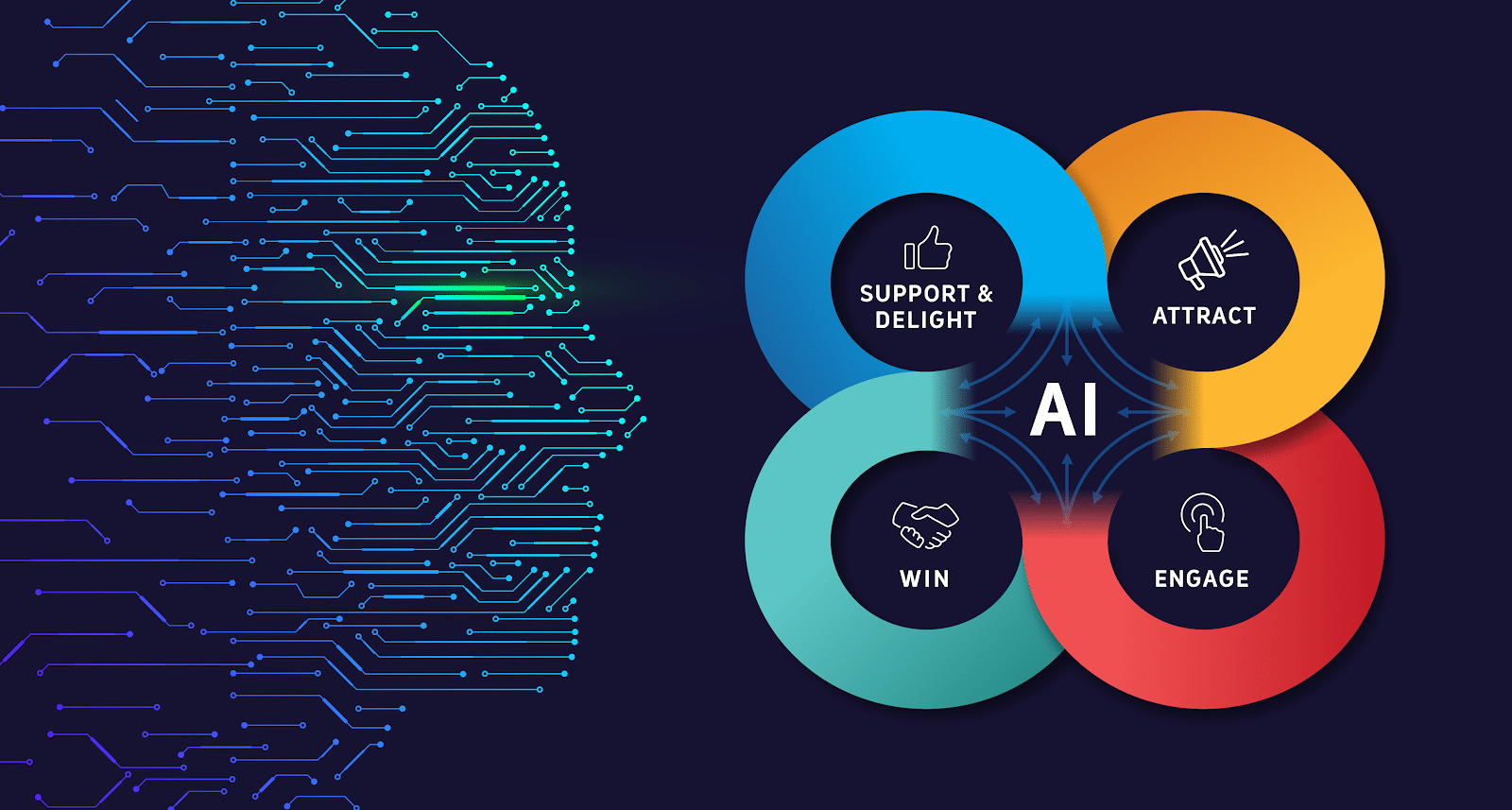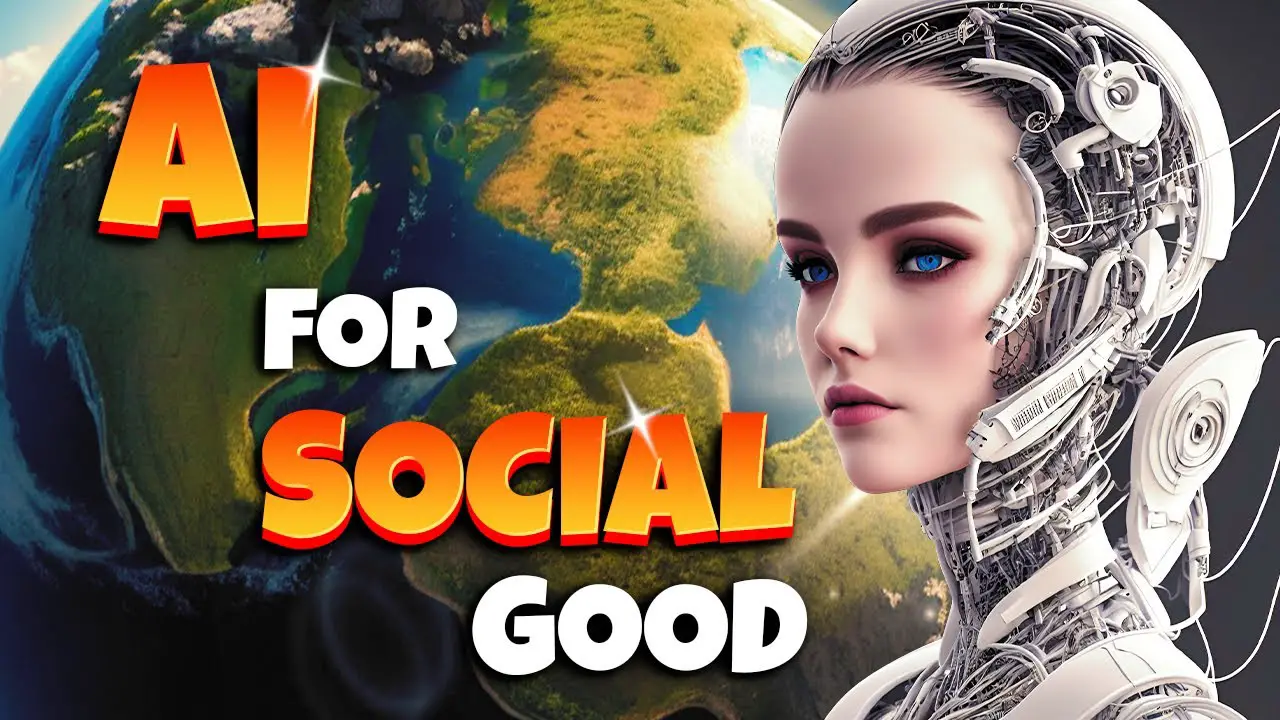AI for Social Good: Harnessing Technology to Tackle Global Challenges

Artificial Intelligence (AI) has emerged as a transformative technology with the potential to revolutionize various aspects of society. As AI continues to advance, it holds immense promise for addressing global challenges and fostering social good. From healthcare to education, environmental sustainability to economic development, AI can play a pivotal role in creating a more equitable and sustainable world. Let’s explore how AI is being harnessed to solve some of the world’s most pressing issues:
1. Healthcare:

- Early Disease Detection: AI-enabled algorithms can analyze vast amounts of medical data, including electronic health records, lab results, and imaging scans, to identify early indicators of disease. This allows for timely intervention, leading to improved treatment outcomes and potentially saving lives.
- Personalized Medicine: AI can create personalized treatment plans tailored to individual patients’ genetic profiles and health conditions. By analyzing patient data, AI systems can predict how a patient is likely to respond to different treatments, enabling healthcare providers to make more informed decisions.
- Drug Discovery and Development: AI can accelerate the discovery of new drugs and therapies by sifting through vast databases of potential molecules, identifying promising candidates for further research. It can also aid in clinical trial design and optimization, reducing the time and cost of bringing new medicines to market.
2. Education:
- Personalized Learning: AI can be used to develop personalized learning experiences that adapt to each student’s individual needs and learning style. By tracking a student’s progress and identifying areas where they require additional support, AI can tailor content and instructional methods to help them succeed.
- Skill Development: AI-powered tools can assist learners in developing new skills, such as programming, data analysis, and language learning. These tools provide interactive and engaging learning experiences, making it easier for individuals to acquire new knowledge and competencies.
- Accessibility: AI can enhance the accessibility of education, making it available to individuals who may not have traditional access to educational resources. For example, AI-powered language translation tools can break down language barriers, while text-to-speech and speech-to-text technologies can assist individuals with disabilities in accessing educational content.
3. Environmental Sustainability:
- Energy Efficiency: AI can help optimize energy consumption by analyzing patterns of usage and identifying opportunities for conservation. It can also contribute to the development of more efficient energy storage systems, enabling a smoother transition to renewable energy sources.
- Climate Change Mitigation: AI can assist in developing climate change mitigation strategies by modeling and analyzing complex Earth systems. By simulating different scenarios, AI can help decision-makers understand the potential impacts of various policies and actions, enabling them to make informed choices.
- Environmental Monitoring: AI-powered systems can collect and analyze data from various sources, such as satellites, sensors, and IoT devices, to monitor environmental conditions. This data can be used to detect pollution, track deforestation, and identify areas that require conservation efforts.
4. Economic Development:
- Financial Inclusion: AI can help bring financial services to unbanked and underserved populations. By analyzing individuals’ financial data, AI systems can determine their creditworthiness and provide them with access to loans, insurance, and other financial products.
- Supply Chain Optimization: AI can optimize supply chains by analyzing vast amounts of data to identify inefficiencies and potential disruptions. This can lead to cost reductions, improved delivery times, and reduced waste.
- Digital Skills Development: AI-powered tools can help individuals develop digital skills, such as programming, data analysis, and project management, which are in high demand in today’s economy. These skills can open up new job opportunities and empower individuals to actively participate in the digital economy.
As AI continues to evolve, its potential for solving global challenges is immense. By harnessing the power of AI and collaborating across sectors, we can leverage technology to create a more inclusive, sustainable, and prosperous world. However, it is crucial to ensure that AI is developed and implemented in a responsible and ethical manner, with safeguards in place to mitigate potential risks and biases. By working together, we can harness the transformative power of AI to make a real difference in addressing the world’s most pressing challenges.Title: [Ai For Social Good: Solving Global Challenges]
H2 – Executive Summary:
Artificial Intelligence (AI) has emerged as a transformative force, revolutionizing industries and offering immense potential for positive societal impact. This article explores the remarkable ways in which AI is being harnessed to address global challenges and create a better world. We delve into specific applications of AI for social good, from healthcare advancements to environmental conservation, economic empowerment, and education. By shedding light on these innovative solutions, we aim to inspire further collaboration and action towards leveraging AI’s capabilities for the betterment of humanity.
Introduction:
AI, with its remarkable ability to learn, adapt, and solve complex problems, has become an invaluable tool in tackling pressing global challenges. From healthcare to education, environmental conservation to economic development, AI is empowering individuals and organizations to make informed decisions, optimize resource allocation, and find creative solutions that were previously unattainable. In this article, we delve into the diverse applications of AI for social good, highlighting its transformative impact and the immense potential it holds for shaping a brighter future.
H2 – Healthcare Advancements:
AI’s prowess in data analysis, pattern recognition, and predictive modeling makes it a powerful ally in the fight against disease.
- Early Detection and Diagnostics: AI algorithms can analyze medical images, patient records, and genetic data to detect early signs of disease, enabling timely intervention and improving treatment outcomes.
- Personalized Medicine: AI can tailor treatment plans to individual patients based on their unique genetic makeup, medical history, and lifestyle, leading to more effective and targeted therapies.
- Drug Discovery and Development: AI can accelerate the discovery of new drugs and vaccines by analyzing vast amounts of data, identifying potential candidates, and predicting their efficacy and safety.
- Epidemic Control: AI can help monitor disease outbreaks, track the spread of epidemics, and develop effective containment strategies, mitigating the impact of public health crises.
- Remote Healthcare: AI-powered telemedicine platforms enable patients to access medical care remotely, particularly in underserved areas or during emergencies.
H2 – Environmental Conservation:
AI plays a pivotal role in protecting the environment and ensuring sustainable development.
- Climate Change Mitigation: AI can optimize energy usage, predict weather patterns, and develop renewable energy sources, aiding efforts to reduce greenhouse gas emissions.
- Pollution Control: AI sensors can monitor air and water quality in real time, enabling timely interventions to address pollution sources and protect ecosystems.
- Conservation Efforts: AI can analyze satellite imagery, animal behavior, and ecological data to identify areas of biodiversity, track endangered species, and inform conservation strategies.
- Disaster Management: AI can provide early warnings for natural disasters, help optimize emergency response efforts, and facilitate post-disaster recovery.
- Sustainable Agriculture: AI can optimize agricultural practices, improve crop yields, and reduce the environmental impact of farming.
H2 – Economic Empowerment:
AI is a catalyst for economic growth and inclusion, creating opportunities for all.
- Financial Inclusion: AI-powered fintech solutions can provide financial services to underserved populations, such as mobile banking and microfinance, promoting financial stability and economic resilience.
- Job Creation: AI can create new jobs in fields such as data science, machine learning, and robotics, while also enhancing productivity and efficiency in various industries.
- Skill Development: AI-powered educational platforms can personalize learning experiences, provide real-time feedback, and help individuals develop in-demand skills for the modern job market.
- Entrepreneurship Support: AI can help small businesses with market analysis, customer relationship management, and supply chain optimization, empowering them to compete effectively in the global economy.
- E-commerce and Marketplaces: AI-driven e-commerce platforms and online marketplaces connect buyers and sellers seamlessly, expanding economic opportunities for small businesses and entrepreneurs.
H2 – Education and Learning:
AI is transforming education, making it more accessible, engaging, and effective.
- Personalized Learning: AI-powered adaptive learning platforms can tailor educational content and assessments to individual student needs, improving learning outcomes and motivation.
- Virtual and Remote Learning: AI-enabled virtual learning platforms and online courses provide accessible and flexible education opportunities, particularly for students in remote or underserved areas.
- Skill Assessment and Feedback: AI can provide real-time feedback on student performance, helping them identify areas for improvement and track their progress.
- Educational Chatbots: AI-powered chatbots can simulate human conversations, providing students with immediate assistance, answering questions, and guiding them through learning materials.
- Content Creation and Delivery: AI can generate educational content, such as videos, simulations, and interactive quizzes, enhancing student engagement and understanding.
H2 – Conclusion:
The potential of AI for social good is vast and ever-expanding. As AI technology continues to advance, we can expect even more innovative and impactful applications in the years to come. By embracing AI as a force for positive change, we can work towards a future where everyone has the opportunity to thrive, where pressing global challenges are solved, and where technology serves as a catalyst for a more sustainable, just, and equitable world.
Keyword Phrase Tags:
- Artificial Intelligence (AI) for Social Good
- AI Applications for Global Challenges
- AI in Healthcare Advancements
- AI for Environmental Sustainability
- AI in Education and Skill Development

This article is insightful. Good one!
The article is very nice and interesting but needy of some rewrittens, it has so many grammatical errors.
The article makes a very reasonable viewpoint with an excessive use of slang expressions that seem weirdly utilized by the author and don’t fit reader with high intellectual level.
Oh, another article with nothing new. This was a waste of my time and efforts.
Is there any real world example or case study on how it was useful?
This article is like a bad joke. It’s not funny, and it’s not even informative.
This article is like a bad movie. It’s full of errors, and it’s a waste of time.
The article presents a good overview of the topic, but it could benefit from more in-depth analysis and evidence to support the claims made.
This article is full of unsubstantiated claims and wishful thinking. I’m not convinced that AI can solve all the world’s problems.
This article is a great inspiration! AI has the potential to change the world for the better, and I’m excited to see what the future holds.
This article is nothing but hype. AI is not a magic bullet that will solve all our problems. It’s important to be realistic about the limitations of technology.
This article is like a bad joke. It’s full of errors but in a funny way.
This article is very engaging and thought provoking. I’m interested in learning more about how AI can be used to address global challenges.
I am an AI developer, and this article perfectly captures the potential of AI to make a positive impact on the world.
This article gives me hope for the future. AI has the potential to solve some of the world’s most pressing problems, and I’m excited to see what the future holds.